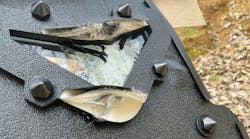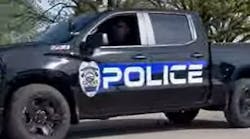The human resources departments of law enforcement agencies go to great lengths to try and hire the best candidates. Oral interviews, background investigations, psychological testing and polygraphs are par for the course in the hiring process. But Written Inc. of Temecula, California, is offering up another type of examination where a candidate's handwriting characters unwittingly reveal his character.
Handwriting analysis works the same way as any other body language, and Written Inc. views an individual's handwriting as his Written Body Language. The lines, loops, placement and pressure of written words on the page can reveal just as much if not more about a person than his hand shake, use of eye contact and decorum in an interview setting.
"We know how to read and interpret handwriting to tell if a person is going to be aggressive, angry, indifferent or enthusiastic," says Richard Vener, president of Written Inc. "We can find things that cannot be found any other way, for example moodiness, disorganization, deceit, aggressiveness and many more."
Unknown to Written Inc., retired Cpl. Darryl Bolke, a nearly 20-year veteran of the Ontario (California) Police Department, tried to manipulate its Candidate Insight screening system, but it didn't work. He completed three samples -- one in block print; one in cursive, which has not been his chosen writing style for years; and one left-handed, although Bolke is right-handed.
"Every one of the results came back almost the same, and all the important qualities were exactly the same," says Bolke. "That is when I instantly became a believer. I really tried to mess with the program, and it was right on the money on all three."
Ryan Vener, vice president of this family-owned company, explains that despite a candidate's best efforts to manipulate the system, the identifiers Written Inc. examines do not change. "Even if the handwriting looks completely different, what we find in the handwriting doesn't change," says Vener. "Candidates can't get away from who they are, so the accuracy is maintained regardless of whether they are trying to fool us or not."
Finding meaning behind the words
The Written Inc. screening and resultant Candidate Insight Report can be used for both pre- and post-employment purposes. In either case, the individual copies two short paragraphs of supplied text using a ballpoint pen and writing on a flat surface. "We developed these paragraphs to get the maximum amount of information and greatest accuracy," says Ryan.
Shorter handwriting samples -- such as a sticky note, thank you or threatening piece of fan mail -- also could be used, but especially in a pre-employment setting, Written Inc. prefers the stock two-paragraph submission. "For us to be confident and have some consistency, we prefer to utilize the two paragraphs," says Ryan.
Once completed by the candidate, the paragraphs are faxed to Written Inc. The handwriting analyst uses a computer program, developed by Richard, to increase the accuracy and speed at which the submissions are examined. "We can do hundreds a day just as accurately or more accurately than someone doing the work by hand," notes Ryan.
Following analysis a Candidate Insight Report is completed and returned to the client. Listed at the top of the report is a summary of positive, caution, negative and warning traits. Positive traits are desirable regardless of the situation and include flexible, high-energy and innovative. Caution traits indicate a potentially negative trait depending on the circumstances. For example, the Insight Report may identify that a candidate prefers to work alone. This may be a positive or negative attribute given the situation. Negative traits are always undesirable and include poor team player, self-centered and inconsiderate. Warning traits should raise extreme caution for the interviewer. These traits include deception and extreme anger. A given candidate may have traits in each of these four categories or only a select few.
Following the Trait Summary are the Insight Statements, which create the majority of the report. Each of these concise statements describes a key piece of the candidate's personality. There are thousands of possible high-impact, non-generic Insight Statements. Examples of positive and negative Insight Statements include:
- Intelligent, creative and innovative; always looking for a better way to get the job done.
- Has an exaggerated sense of self-importance; overly sensitive to criticism.
- Thinks everyone is out to get them.
- Intense angry feelings; unlikely to take responsibility for the hostility they feel.
"People doing hiring or interviewing can use the Candidate Insight Report to quickly make a decision whether they want to move the individual along in the interview process or look at other candidates," explains Ryan. "This short, easy to read and understand synopsis of the individual can be used as a road map for the interview."
Ryan gives as an example an individual whose profile indicates he is stubborn. Knowing this, the interviewer may adjust the questions he asks or how he interprets the responses. "Ultimately the question becomes, 'Can we live with this stubborn individual who has some other positive traits?' " says Ryan.
Although developed for corporate America, Bolke views this pre-employment screening opportunity as a great advantage to law enforcement. "With such a public trust and high-level authority position, it's critical this type of technology be used in the hiring process," he says. "For what it costs to complete one of these profiles, it is worth it to keep a horrifically bad apple out of your organization.
"Combining this test with a polygraph and background investigation will really get all your ducks in a row."
Improving employees
The Candidate Insight service also can be used to better aid current employees when pursuing career paths and resolving conflict. The law enforcement field requires officers with diverse skill sets. There are detail-oriented investigators, workhorse traffic enforcement officers who can't stand being behind a desk and enjoy issuing tickets, and deceptive, quick-thinking undercover operatives, just to name a few.
"You need all of these people to make law enforcement work," says Bolke. "But what often happens is people end up in the wrong position and get labeled as potentially bad employees. If a tool like Candidate Insight were used constructively, you could get much better use of your employees by better fitting them to their jobs."
Traits deemed negative could be turned into positives, and positives as negative. Bolke gives as an example the position of undercover narcotics agent. A by-the-book, detail-oriented, high moral authority person would be better suited to a highly proactive, uniformed crime suppression unit than undercover work. In the same way, an individual whose profile indicates a strong sense of right and wrong and yet a tendency toward deceptiveness would be better suited to the undercover environment.
"If we can take some of these people who have negative traits and find places where those negatives are positive, you can better utilize your personnel just based on this," he says. "All of a sudden this person is going to be your best employee rather than your worst because you have him in the right place for what his personality is."
Knowing an employee's positive and negative traits also can aid in dealing with problems in work performance. Bolke uses one of his own negatives -- doesn't like to be wrong -- as an example. If his supervisor would call Bolke into his office and tell him that how he handled an incident was wrong, Bolke admits he would immediately put up his defenses, and what could have been a constructive discussion becomes a conflict.
But if both parties know the personality traits ahead of time, and that such a way is probably not how to approach this person, another plan of attack can be made. Instead of saying the officer was wrong in his tactics, the supervisor can suggest that there may be a better way to handle the incident and ask the officer for suggestions in how to improve his job. "They are going to be far more receptive to a way to better improve how they work as opposed to telling them they were wrong in how they handled something," explains Bolke.
Personal profitability
Even if departments do not mandate the use of Candidate Insight for all employees -- pre- or post-hire -- officers may still want to pursue a screening for their own personal benefit. "It can have such a positive effect on personnel understanding their own personality traits when they are looking at career paths," says Bolke. "I've found that having my own done and seeing what my negative traits were has been helpful."
As mentioned previously, not all negative traits are negative dependent upon the situation. Bolke's negative of not liking to be wrong also indicates that he takes pride in his work and is very self confident. By knowing his positives, he is able to understand why he approaches situations the way he does.
"Anybody who really wants to succeed is going to be very self critical," notes Bolke. "This gives employees a tool to analyze themselves and supervisors a tool to better understand their employees. If supervisors find a job that works with the person's personality traits, they will get higher morale and a higher propensity for not having problems."
Investigative insight
In addition to being a police officer, Bolke also worked in private security, and continues to now in retirement with Abila Security & Investigations Inc., located in Santa Margarita, California. He identifies several investigative uses for Written Inc.'s expertise in private security. When working VIP and executive protection, the Candidate Insight evaluation should be performed on any of the VIP's staff members. "I want to know if the babysitter is a sexual deviant, if there is a staff member with questionable ethics who may sell a celebrity's information to the paparazzi or someone with low moral integrity handling finances," he explains.
Separating adoring fans from stalkers is another private security use. "If we do one of these profiles on a letter and hit on several warning traits, then I would know this is a very serious person we need to take a look at," says Bolke. "I wouldn't just go arrest the suspect on this, but I would see what else is out there on him because the threat level has gone off the charts."
In addition, Bolke points out that using this screening process can save time, resources and money. "As an investigative tool you can separate out which suspects to take a hard look at and which ones don't rise to the same level," he says. "Getting investigators going in the right direction can be a huge savings."
Whether it is used to accentuate the good in employees or identify the evil in criminals, Candidate Insight has a variety of applications in the law enforcement community. "The key is that it be used as 'a' tool and not 'the' tool," says Bolke, noting that Candidate Insight can be an aid in investigations and hiring practices but shouldn't be the sole piece of evidence in making any decisions. "People need to be careful to use it as part of the complete puzzle as opposed to the only piece."
Ryan agrees. "We're not saying hire or fire people based on the information we're sending," he says. "Just take this into consideration like any other piece of the interview process."
The next time a candidate's character is in question, let his handwriting characters provide the insight.
Criminal connections
In 2000, a European university solicited Written Inc. to complete a Candidate Insight profile on a former student that was hired by the financial aid department following graduation. The student had a high GPA and came from a well-regarded family, but did not have much work experience. Not long after being on the job, the student flew into spontaneous violent rages. Being a martial arts black belt, his coworkers became very afraid of him. When the university finally fired the student, he threatened to "cut the eyes out" of his supervisor.
Following his expulsion from the job, the university had Written Inc. perform a profile to determine if the threats should be taken seriously. Without any prior knowledge of the situation, analysts reviewed a portion of his job application as a writing sample and determined the "individual was very violent and likely to act on his violence and any threats made," says Ryan Vener, vice president of the Temecula, California-based company.
The university posted a guard at the financial aid office, and three weeks later, the former employee returned to campus with a knife. He was taken into custody.
Seven years later, analysts at Written Inc. had the opportunity to review the Express Mail package Virginia Tech shooter Seung-Hui Cho sent to NBC News. Even with this small writing sample, Written Inc. was able to develop a full profile on Cho. Coincidentally, Cho and the European student shared nine trait statements in their Candidate Insight Reports. Those traits are:
- Sarcastic and temperamental.
- A braggart; self-centered and obstinate.
- Critical and opinionated.
- Thinks everyone is out to get them.
- Physically aggressive, confrontational.
- Intense angry feelings, unlikely to take responsibility for the hostility they feel.
- Angry, defensive, blames others and rarely thinks it's their fault.
- May be brutal and sadistic.
- Emotionally erratic; you never know what to expect.
"After seeing the similarities between these two men, I'm confident that Candidate Insight helped to avoid a very bad situation," says Vener, referencing the 2000 European incident.


